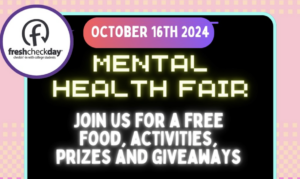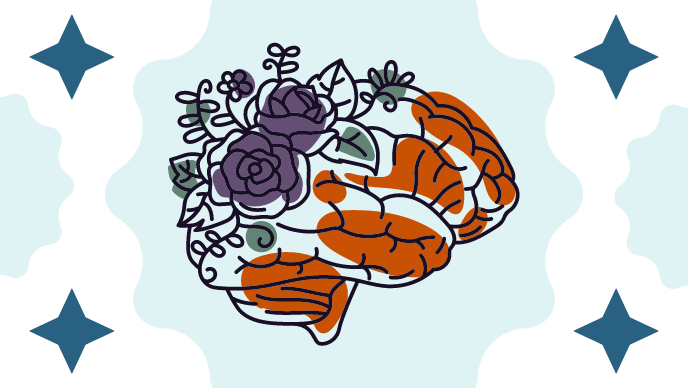Thursday, October 10, is World Mental Health Day, an important opportunity to raise awareness of mental health, normalize and destigmatize conversations about mental health, and amplify opportunities, strategies, and tools in service to individual and collective mental health.
Mental health includes our emotional, psychological, and social well-being. It affects how we think, feel, and act, and helps determine how we handle stress, relate to others, and make decisions (SAMHSA).
 Much like our physical health and wellbeing, we all have mental health that needs tending to (Project LETS).
Much like our physical health and wellbeing, we all have mental health that needs tending to (Project LETS).
The World Foundation for Mental Health initially observed World Mental Health Day on October 10, 1992. Over the years their annual recognition and themes also note important intersectionalities of identity and experience connected with mental health.
The following are events, offerings, and resources in support of mental health for Emersonians and beyond.
Wishing you comfort and peace today, and all days.
Events
Healing Workshop Series
The Healing Workshop Series hosted by the Healing & Advocacy Collective explores different forms of creative expression that can support healing. Come one time or every time!
No experience needed, no need to register, all materials and instructions provided.
Beard Room, Piano Row 202, 5-6pm on Thursdays.
October 10: Squish Balls
October 17: Keychains
October 24: Magnets
October 31: Mini Pumpkin Painting
November 7: Clay Bowls
November 14: Pop-up Photo Book
Fresh Check Day Mental Health Fair
 Level up your mental health! Join the annual Fresh Check Day Mental Health Fair on October 16, from 1:30pm-4:30pm! Interactive booths, snacks, free giveaways and prizes! Hosted by more than 10 campus partners, Fresh Check Day is an uplifting event that focuses on checking in on your mental health and how to support others who may be struggling. Show up for yourself and others!
Level up your mental health! Join the annual Fresh Check Day Mental Health Fair on October 16, from 1:30pm-4:30pm! Interactive booths, snacks, free giveaways and prizes! Hosted by more than 10 campus partners, Fresh Check Day is an uplifting event that focuses on checking in on your mental health and how to support others who may be struggling. Show up for yourself and others!
Yoga for Healing
Wednesdays, 4-5pm through November 13.
Little Building, Lower Level, Studio 2.
Trauma Centered Trauma-Sensitive Yoga focused on listening to your body. No physical assists, no experience necessary, mat/chair provided, and all bodies welcome. Come one time or every time.
Emerson Wellness Center Ongoing Support Groups and Workshops
 Groups and Workshops can be helpful additions or alternatives to individual counseling. At Counseling Services, groups are free and confidential. You’re welcome and encouraged to attend throughout your time at Emerson.
Groups and Workshops can be helpful additions or alternatives to individual counseling. At Counseling Services, groups are free and confidential. You’re welcome and encouraged to attend throughout your time at Emerson.
“Protect Your Peace” Events from Intercultural Student Affairs and Emerson Wellness Center
- October 25, 2pm-4pm: Painting Mandalas, Cultural Center, 172 Tremont.
-
October 30, 1pm-2pm: Peaceful Stretching, Bordy Theater, 216 Tremont.
-
October 30, 2pm-3pm: Circle of Control, Bordy Theater, 216 Tremont.
-
November 5: Vision Boards and Tea, Cultural Center, 172 Tremont.
Learn More
From Mental Health America: 23% of adults experience mental illness.
–
“I don’t get stage fright…I get life fright.” – Jordan Raskopoulos on Living With High Functioning Anxiety.
–
Let’s Normalize Men’s Mental Health from Mental Health America Of Hawai`i.
–
PBS’s Decolonizing Mental Health Series.
–
 From Indigo Therapy Group, Understanding and Healing from Identity-Based Trauma.
From Indigo Therapy Group, Understanding and Healing from Identity-Based Trauma.
–
Project LETS offers additional framings of mental health, strategies for how to bring it up with others, and tips on how to support someone if they share their mental health story with you.
–
The National Institute of Mental Health offers these tips to take care of mental health, but it’s important to recognize that self-care is not a one-size fits all. Explore what resonates with you, and what you might be curious about.
-
Get regular exercise. Just 30 minutes of walking every day can boost your mood and improve your health. Small amounts of exercise add up, so don’t be discouraged if you can’t do 30 minutes at one time.
-
Eat healthy, regular meals and stay hydrated. A balanced diet and plenty of water can improve your energy and focus throughout the day. Pay attention to your intake of caffeine and alcohol and how they affect your mood and well-being—for some, decreasing caffeine and alcohol consumption can be helpful.
-
Make sleep a priority. Stick to a schedule, and make sure you’re getting enough sleep. Blue light from devices and screens can make it harder to fall asleep, so reduce blue light exposure from your phone or computer before bedtime.
-
Try a relaxing activity. Explore relaxation or wellness programs or apps, which may incorporate meditation, muscle relaxation, or breathing exercises. Schedule regular times for these and other healthy activities you enjoy, such as listening to music, reading, spending time in nature, and engaging in low-stress hobbies.
-
Set goals and priorities. Decide what must get done now and what can wait. Learn to say “no” to new tasks if you start to feel like you’re taking on too much. Try to appreciate what you have accomplished at the end of the day.
-
Practice gratitude. Remind yourself daily of things you are grateful for. Be specific. Write them down or replay them in your mind.
-
Focus on positivity. Identify and challenge your negative and unhelpful thoughts.
Stay connected. Reach out to friends or family members who can provide emotional support and practical help.
–
Emerson Resources



